七年级英语下第12单元 阅读课
人教版新目标七年级英语下册Unit12说课稿
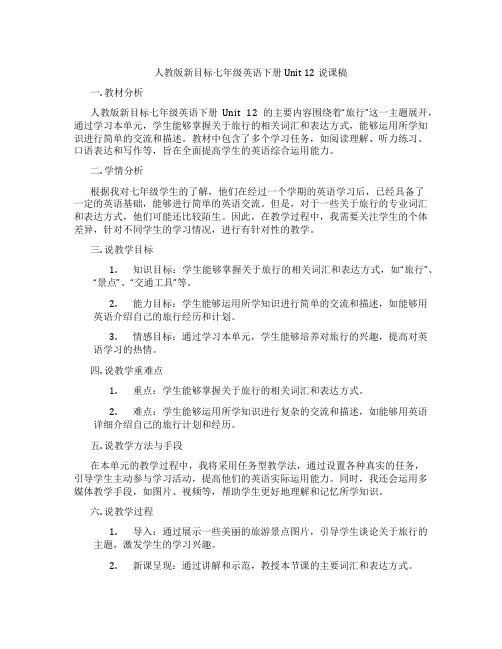
人教版新目标七年级英语下册 Unit 12说课稿一. 教材分析人教版新目标七年级英语下册Unit 12的主要内容围绕着“旅行”这一主题展开,通过学习本单元,学生能够掌握关于旅行的相关词汇和表达方式,能够运用所学知识进行简单的交流和描述。
教材中包含了多个学习任务,如阅读理解、听力练习、口语表达和写作等,旨在全面提高学生的英语综合运用能力。
二. 学情分析根据我对七年级学生的了解,他们在经过一个学期的英语学习后,已经具备了一定的英语基础,能够进行简单的英语交流。
但是,对于一些关于旅行的专业词汇和表达方式,他们可能还比较陌生。
因此,在教学过程中,我需要关注学生的个体差异,针对不同学生的学习情况,进行有针对性的教学。
三. 说教学目标1.知识目标:学生能够掌握关于旅行的相关词汇和表达方式,如“旅行”、“景点”、“交通工具”等。
2.能力目标:学生能够运用所学知识进行简单的交流和描述,如能够用英语介绍自己的旅行经历和计划。
3.情感目标:通过学习本单元,学生能够培养对旅行的兴趣,提高对英语学习的热情。
四. 说教学重难点1.重点:学生能够掌握关于旅行的相关词汇和表达方式。
2.难点:学生能够运用所学知识进行复杂的交流和描述,如能够用英语详细介绍自己的旅行计划和经历。
五. 说教学方法与手段在本单元的教学过程中,我将采用任务型教学法,通过设置各种真实的任务,引导学生主动参与学习活动,提高他们的英语实际运用能力。
同时,我还会运用多媒体教学手段,如图片、视频等,帮助学生更好地理解和记忆所学知识。
六. 说教学过程1.导入:通过展示一些美丽的旅游景点图片,引导学生谈论关于旅行的主题,激发学生的学习兴趣。
2.新课呈现:通过讲解和示范,教授本节课的主要词汇和表达方式。
3.任务实践:设置各种任务,如小组讨论、角色扮演等,让学生在实际语境中运用所学知识。
4.巩固练习:通过听力练习、口语表达和写作等环节,巩固所学知识。
5.课堂总结:对本节课的主要内容进行总结,强调重点和难点。
人教新目标七年级英语下册 Unit12 单元阅读训练 含答案
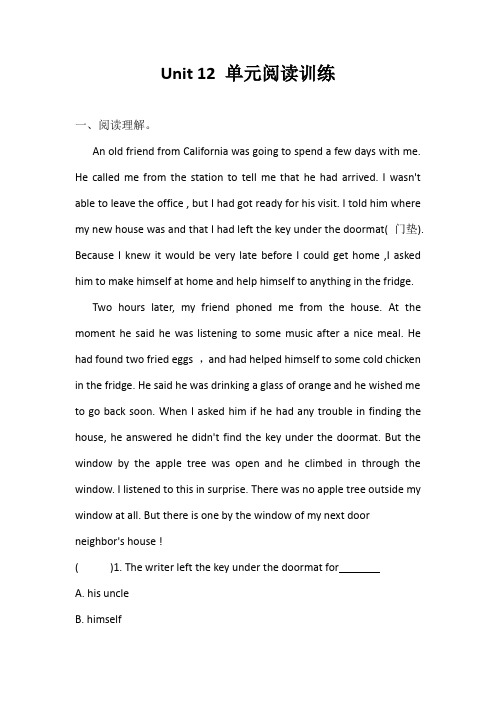
Unit 12 单元阅读训练一、阅读理解。
An old friend from California was going to spend a few days with me. He called me from the station to tell me that he had arrived. I wasn't able to leave the office , but I had got ready for his visit. I told him where my new house was and that I had left the key under the doormat( 门垫). Because I knew it would be very late before I could get home ,I asked him to make himself at home and help himself to anything in the fridge.Two hours later, my friend phoned me from the house. At the moment he said he was listening to some music after a nice meal. He had found two fried eggs ,and had helped himself to some cold chicken in the fridge. He said he was drinking a glass of orange and he wished me to go back soon. When I asked him if he had any trouble in finding the house, he answered he didn't find the key under the doormat. But the window by the apple tree was open and he climbed in through the window. I listened to this in surprise. There was no apple tree outside my window at all. But there is one by the window of my next door neighbor's house !( )1. The writer left the key under the doormat forA. his uncleB. himselfC. his friendD. his children( )2. The writer told his friend to look after himself before he got home becauseA. he would get home very late.B. his friend would stay with him for a few days.C. his friend would not mind that.D. he would not be able to return home that day.( )3. His friend told him on the phone thatA. he found the house without any trouble.B. he enjoyed himself very much in the house.C. he found the key very easily.D. he liked his new house.( )4. How did the writer's friend come into the house?A. He used the key to open the door.B. He got in easily because the door was open.C. He got in through the window.D. He knocked at the door.( )5. Which of the followings is RIGHT?A.The writer's friend were into the wrong house.B. The writer's friend liked the neighbor's house.C. The writer's house was easy to find.D. The window of the writher's room was open.二、任务型阅读。
初中英语_7下Unit12SectionBReadingAWeekendtoRemember教学设计学情分析教材分析课后反思
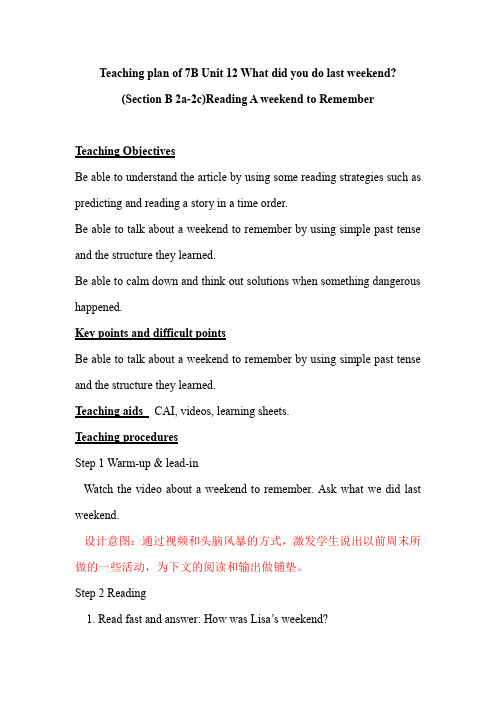
Teaching plan of 7B Unit 12 What did you do last weekend?(Section B 2a-2c)Reading A weekend to RememberTeaching ObjectivesBe able to understand the article by using some reading strategies such as predicting and reading a story in a time order.Be able to talk about a weekend to remember by using simple past tense and the structure they learned.Be able to calm down and think out solutions when something dangerous happened.Key points and difficult pointsBe able to talk about a weekend to remember by using simple past tense and the structure they learned.Teaching aids CAI, videos, learning sheets.Teaching proceduresStep 1 Warm-up & lead-inWatch the video about a weekend to remember. Ask what we did last weekend.设计意图:通过视频和头脑风暴的方式,激发学生说出以前周末所做的一些活动,为下文的阅读和输出做铺垫。
Step 2 Reading1. Read fast and answer: How was Lisa’s weekend?Ask ss “What are we talking about?” Guide ss to get the main idea by reading the title and get them to look at the picture to guess something. Then ask ss to read the passage quickly and answer: How was Lisa’s weekend?设计意图:通过略读的方式,让学生掌握文本的大意和线索,并通过看图片对要读的文章产生预期。
外研版英语七年级下册Module 12《Western music》主题阅读
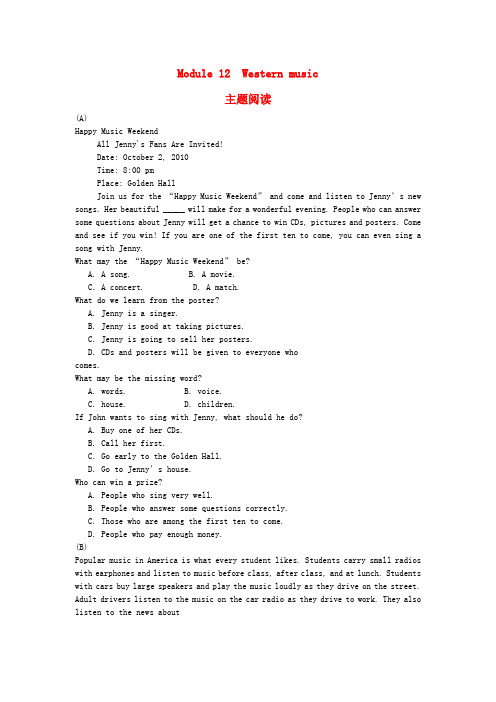
Module 12 Western music主题阅读(A)Happy Music WeekendAll Jenny's Fans Are Invited!Date: October 2, 2010Time: 8:00 pmPlace: Golden HallJoin us for the “Happy Music Weekend” and come and listen to Jenny’s new songs. Her beautiful _____ will make for a wonderful evening. People who can answer some questions about Jenny will get a chance to win CDs, pictures and posters. Come and see if you win! If you are one of the first ten to come, you can even sing a song with Jenny.What m ay the “Happy Music Weekend” be?A. A song.B. A movie.C. A concert.D. A match.What do we learn from the poster?A. Jenny is a singer.B. Jenny is good at taking pictures.C. Jenny is going to sell her posters.D. CDs and posters will be given to everyone whocomes.What may be the missing word?A. words.B. voice.C. house.D. children.If John wants to sing with Jenny, what should he do?A. Buy one of her CDs.B. Call her first.C. Go early to the Golden Hall.D. Go to Jenny’s house.Who can win a prize?A. People who sing very well.B. People who answer some questions correctly.C. Those who are among the first ten to come.D. People who pay enough money.(B)Popular music in America is what every student likes. Students carry small radios with earphones and listen to music before class, after class, and at lunch. Students with cars buy large speakers and play the music loudly as they drive on the street. Adult drivers listen to the music on the car radio as they drive to work. They also listen to the news aboutsports, the weather and the life of American people. Most of the radio programmes are music.Pop music singers make much money. They make CDs or tapes which radio stations in many places broadcast. Once the popular singer is heard all over the country, young people buy his or her tapes. Some of the money from these tapes comes to the singer. Wherever the singer goes, all the young people want to meet him or her. Now the singer has become a pop star.There are other kinds of music that are popular among Americans. One is called folk music. It tells stories about the common life of America. Another is called western or country music. This was started by cowboys who would sing at night to the cows they were watching. Today, any music about the country life and love between a country boy and his girl is called western or country music.1. ______ kinds of music are mentioned in this passage.A. TwoB. ThreeC. FourD. Five2. When pop singers ______ , they are regarded as stars.A. make much moneyB. become popular with their fansC. make a CD or tapeD. are wanted to sing on the radio3. From the passage we know that country music is about the________.A. common life of AmericaB. country life and love storiesC. life of cowboysD. school life in America4. Which of the following is TRUE according to this passage?A. Most students in America like popular songs.B. Students with cars in America only like to listen to music while driving.C. Adult drivers in America only listen to music while driving.D. Everyone in America wants to meet pop singers wherever they go.主题阅读(A) 1—5 CABCB(B) 1—4 BBBA。
初中英语_7下Unit12SectionBReadingAWeekendtoRemember教学课件
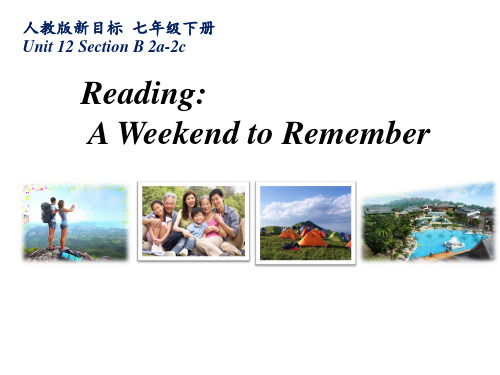
worship the snake as the god
尊蛇为神
Snakes are the symbol of India.
Read again and think over
list the things Lisa’s family did during the camping.
China
put up a tent
made a fire
went camping
Sat under the moon
told stories
Read Para. 3 A scary day!
Remember
What we did
What we learned
What happened
Group work
A Weekend to Remember
1. Make a survey about your weekend to remember in your group using the questions on the blackboard.
What can we learn from Lisa’s weekend? When you are in danger, be brave. Try to use the smart way to save yourself!
Retell & Summary
Where
How
……
A Weekend to
Write a passage about your weekend to remember.
If you can:
Try to find out how students spend their weekends in different countries.
Unit12单元阅读理解人教版七年级英语下册
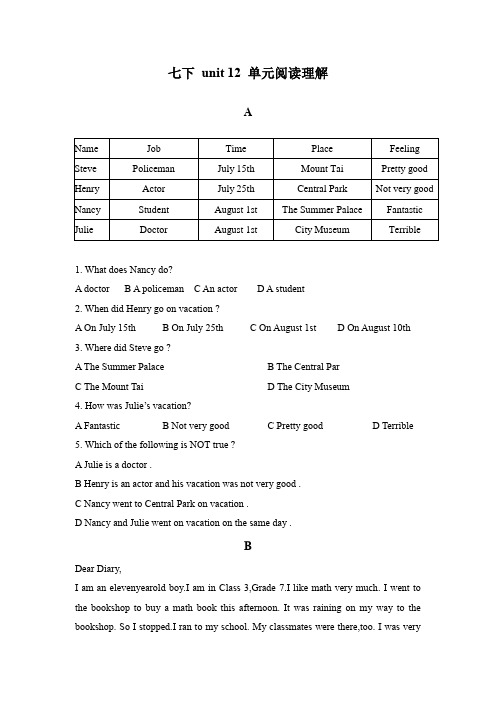
七下unit 12 单元阅读理解A1. What does Nancy do?A doctorB A policemanC An actorD A student2. When did Henry go on vacation ?A On July 15thB On July 25thC On August 1stD On August 10th3. Where did Steve go ?A The Summer PalaceB The Central ParC The Mount TaiD The City Museum4. How was Julie’s vacation?A FantasticB Not very goodC Pretty goodD Terrible5. Which of the following is NOT true ?A Julie is a doctor .B Henry is an actor and his vacation was not very good .C Nancy went to Central Park on vacation .D Nancy and Julie went on vacation on the same day .BDear Diary,I am an elevenyearold boy.I am in Class 3,Grade 7.I like math very much. I went to the bookshop to buy a math book this afternoon. It was raining on my way to the bookshop. So I stopped.I ran to my school. My classmates were there,too. I was veryhappy. I saw my watch. It was a quarter past three. I wanted t o play games. I played pingpong with my classmates in school’s pingpong room. At half past four,the rain stopped. I went to the bookshop.Zhang Xin1.Zhang Xin wanted to buy book.A.a ChineseB.a mathC.an EnglishD.a story2.What was the weather like?A.It was sunny.B.It was windy.C.It was snowy.D.It was rainy.3.Zhang Xin went to be cause it rained.A.the post officeB.his schoolC.his homeD.the shop4.It was when Zhang Xin got to the school.A.a quarter to threeB.a quarter past threeC.half past threeD.twenty past three5.Zhang Xin played with his classmates.A.chessB.footballC.basketballD.pingpongCMy cousin, Johnny, has a large police dog. Its name is Jack. Every Saturday afternoon, Johnny takes Jack for a long walk in the park. Jack likes these long walks very much. One afternoon, a young man came to visit my cousin. He stayed a long time. He talked and talked. Soon it was time for my cousin to take Jack for a walk. But the man was still there. Jack became very worried (着急的) . He walked around the room several times (好几次) and then sat down in front of the man and looked at him. But the man kept talking. Finally Jack couldn’t stand it. He went out of the room and came back a few minutes later. He sat down again in front of the man, but this time he held (拿住) the man’s hat in his mouth.1. From the story, we know that Jack is ________.A. a young manB. a young man’s friendC. Johnny’s good friendD. a dog2. Where does Johnny walk his dog every Saturday afternoon?A. On the farm.B. In the park.C. In his room.D. In the street.3. Jack became very worried one afternoon because ________.A. Johnny couldn’t take him out for a walk at the usual timeB. a young man came to visit Johnny that afternoonC. Johnny walked around his room several timesD. he couldn’t find the young man’s hat4. What does the underlined word “stand” mean in the passage?A. 支持B. 理解C. 站立D. 忍受5. Why did Jack sit down again in front of the man with the hat in his mouth?A. Like the young man very much.B. Want to talk with the young man.C. Ask the young man to leave.D. Try to make the man laugh.DMost American families like to have vacation in summer.Summer is a good season for vacation.It is often hot in July and August.Children do not go to school in those two months.Some like to stay at home, read books, stay with their families or watch TV.Many families take their lunch to eat at a place with many trees or near a nice lake.Some people have enough time and money to travel(旅行)to other countries like France, Japan and Australia.They usually fly to these countries.Many families travel by car or train to see interesting places in their own countries.Their favorite cities are New York, Chicago, Miami, San Francisco and Los Angeles.Not everyone likes to go to busy cities.Some families travel to mountains or beautiful valleys(山谷).1.According to the passage,______ is a good season for vacation.A.spring B.summer C.autumn D.winter 2.Some children like to stay at home during their vacation.They don't ______. A.read books B.stay with their families C.watch TV D.go to school3.Many families like to have their lunch ______ during their vacation.A.in the office B.near a cinemaC.near a big factory D.near a nice lake4.If you have ______,you can travel to other countries.A.money and friends B.friends and timeC.money and time D.food5.Which of the following is “芝加哥” ?A.Chicago. B.New York. C.Miami. D.Los Angeles.参考答案A1.D2.B3.C4.D5.C【解析】试题分析:短文大意:本题以表格形式介绍了史蒂夫等四个人的姓名,职业,以及在假期中参观的地方,时间和感受等信息B[解析]本文介绍了张鑫写的一篇日记介绍他去书店买书的路上,天上下起了雨,他去学校。
人教版英语七年级下册Unit12全单元 ppt课件

1a
• 1. Don’t arrive late for class.
• 2. Don’t run in the hallways.
• 3. Don’t eat in the classrooms.
• 4. Don’t listen to music in the classrooms or the hallways.
• 5. Don’t fight.
What rules are Peter, Selina and Nick breaking?
1b
Name Peter
Selina Nick
Rule
2
3
4
2020/10/22
人教版英语七年级下册Unit12全单
17
元
1c
A: What are the rules? B: We can’t ___. A: Can we ______? B: No,we can’t.
7
元
Don’t run in the hallways.
2020/10/22
人教版英语七年级下册Unit12全单
8
元
in the classroom
Don’t eat in the classroom.
2020/10/22
人教版英语七年级下册Unit12全单
9
元
Don’t take photos here. No photos!
Sit down, please. 请坐。
否定 Don’t eat in class.
Don’t play sports in the classroom. Don’t fight .
out,outside out一般只用作副词,意为“出去,在外面”,其
初中英语人教版七年级下册unit12 reading 教学设计
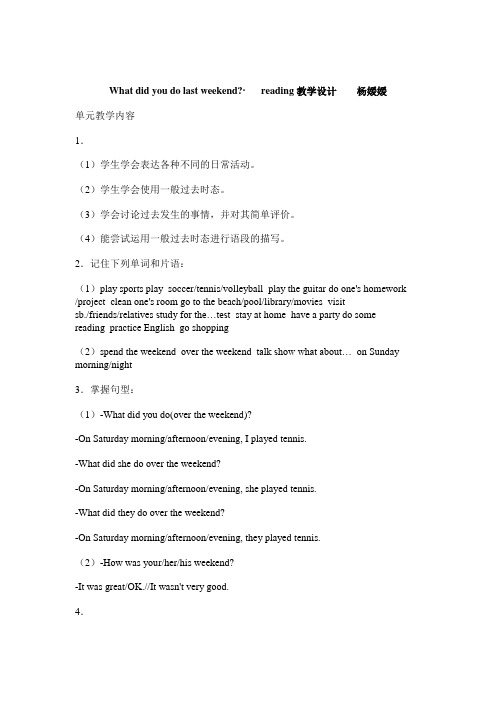
What did you do last weekend?·reading教学设计杨媛媛单元教学内容1.(1)学生学会表达各种不同的日常活动。
(2)学生学会使用一般过去时态。
(3)学会讨论过去发生的事情,并对其简单评价。
(4)能尝试运用一般过去时态进行语段的描写。
2.记住下列单词和片语:(1)play sports play soccer/tennis/volleyball play the guitar do one's homework /project clean one's room go to the beach/pool/library/movies visitsb./friends/relatives study for the…test stay at home have a party do some reading practice English go shopping(2)spend the weekend over the weekend talk show what about… on Sunday morning/night3.掌握句型:(1)-What did you do(over the weekend)?-On Saturday morning/afternoon/evening, I played tennis.-What did she do over the weekend?-On Saturday morning/afternoon/evening, she played tennis.-What did they do over the weekend?-On Saturday morning/afternoon/evening, they played tennis.(2)-How was your/her/his weekend?-It was great/OK.//It wasn't very good.4.(1)动词过去式的变化规则:(2)注意记忆某些动词过去时的不规则变化:am/i s→was, are→were, do→did, go→went, have→had,study→studied, see→saw单元教学目标1.学生能够熟练使用一般过去时态,使时态和时间状语保持一致。
新版(人教版)七年级(下)英语Unit12课文详解

Unit 12 What did you do last weekend?Section A 2a — 2d (P68)* 教师寄语:If you want to understand today, you have to search yesterday.想要懂得今天,就必须研究昨天。
【学习目标】【学习重点】:继续学习谈论过去事件; 学会用疑问词who, what, when。
【体验学习】:预习交流1.根据图片和对话等,预测新课内容;2.根据音标拼读单词并牢记;3.自学课文,勾画出重点和疑惑。
翻译官visit my grandma_______________ 2.备考_____________________3. work as a guide _________________4. over______________________5. How interesting! ________________6. living habit_________________7. kind of _______________________ 8. 熬夜_____________________【课堂导学】:I、新课呈现Step1 Review and Lead-inQuick action: The phrases in 1a or the past forms of the verbs.Step2 PresentationShow some pictures, ask and learn. eg:--What did you/he/ she/they do? --Where did you/he/she/they go?--Who…?Step3 Listening1. Go through the sentences in 2a.2. Listen to 2a and underline the words you hear.3. Listen again. Write C for Carol, J for Jack or B for Becky next to the statements in 2b. Then check the answers.Step4 Pair workStudent A asks questions with who, what or where and Student B answers. Finish 2c. Role-play the conversations in 2d.II、合作交流Group work:模仿2d编写对话,谈论过去事件。
2013版人教版英语七年级下册unit12-What-did-you-do-last-weekend-全单元课件 - 副本

3. What did she do there?
_____________________________ She told the visitors about the _____________________________ butterflies and their living habits. 4. Why is Paul tired now? Because he stayed up late to watch _____________________________ the soccer game. _____________________________
6. 上个周末她去了哪里? Where did she go last weekend? __________________________
_
7. 她去了农场。 She went to the farm. ____________________________
8. 她和谁一起去的? Who did she go with? ___________________________ 9. 她和她的同学们一起去的。 She went with her classmates. _________________________
1b
Do you think the activities in 1a are
fun? Draw a happy face
unhappy face
or an
under each picture.
1c
Listen. What did Sally and Jim do last weekend? Complete the chart. Sally Jim
七年级下Unit12阅读课-课件
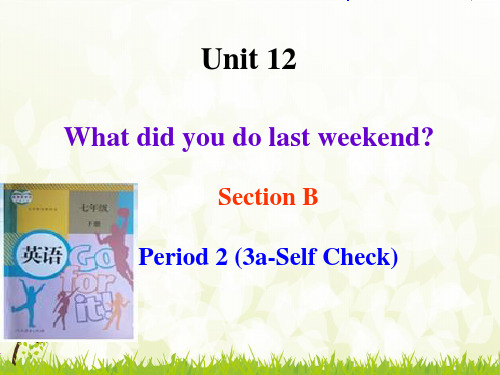
watched TV
3b Write about what you did last weekend.
Last weekend was fun. On Saturday morning, I went shopping at the supermarket with my mother and then we had lunch at home. After lunch, I helped my father with some housework. Later in the afternoon, I played volleyball with my friends at the park. On Sunday morning, I wrote a letter in English to my pen pal. Then I had lunch with my friends at a restaurant near our home. In the evening, I watched a movie with my parents.
Unit 12
What did you do last weekend?
Section B Period 2 (3a-Self Check)
Look at the pictures below. What did they do last weekend?
play the guitar
She played the guitar.
B: ___W__h_a_t__d_i_d_y__o_u__d_o_________ (do)?
A: We watched the firefighters work. What an interesting job they have!
人教版初中英语 七年级下册第十二单元Section A 1a—2c教案-学习文档
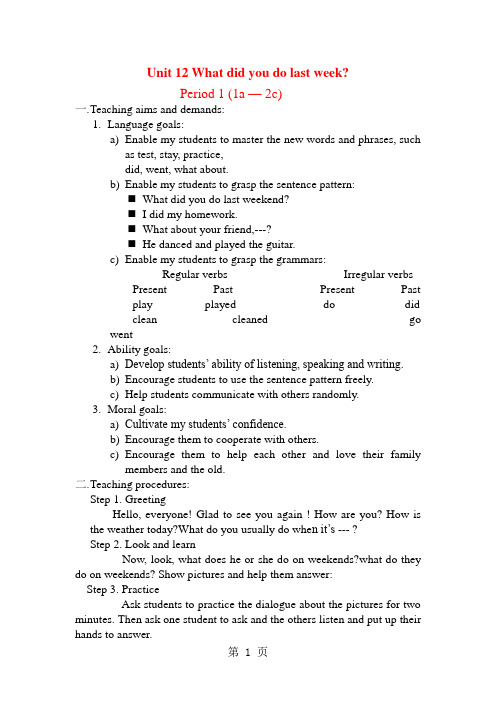
Unit 12 What did you do last week?Period 1 (1a — 2c)一.T eaching aims and demands:nguage goals:a)Enable my students to master the new words and phrases, suchas test, stay, practice,did, went, what about.b)Enable my students to grasp the sentence pattern:⏹What did you do last weekend?⏹I did my homework.⏹What about your friend,---?⏹He danced and played the guitar.c)Enable my students to grasp the grammars:Regular verbs Irregular verbs Present Past Present Pastplay played do didclean cleaned go went2.Ability goals:a)Develop students’ ability of listening, speaking and writing.b)Encourage students to use the sentence pattern freely.c)Help students communicate with others randomly.3.Moral goals:a)Cultivate my students’ confidence.b)Encourage them to cooperate with others.c)Encourage them to help each other and love their familymembers and the old.二.T eaching procedures:Step 1. GreetingHello, everyone! Glad to see you again ! How are you? How is the weather today?What do you usually do whe n it’s --- ?Step 2. Look and learnNow, look, what does he or she do on weekends?what do they do on weekends? Show pictures and help them answer:Step 3. PracticeAsk students to practice the dialogue about the pictures for two minutes. Then ask one student to ask and the others listen and put up their hands to answer.Step 4. PresentationSay we know they do these things on weekends, do you want to know what I do on weekends? I usually watch TV on weekends. But last weekend, I visited my friends.Then show pictures and say her son did his homework,her daughter read books,we went to the cinema. Repeat the new phrases ,then I ask “ What did they do last weekend? Help students answer.Step 5. PracticeAsk and answer in pairs for three minutes, then ask some pairs to act it out.Step 6. Have a chantSay we’ve learned so many past forms of the v erbs, I want to know who can have the chant best.Step 7. Guessing gameTeacher ask “ What did he / she / they do last weekend? , the students guess. They can answer like this: I think he --- ed ---. When the studen t’s answer is right, he /she ca n get a present.Step 8. consolidationDeal with 1a and 1bStep 9. PairworkAsk “ What did Lucy do last weekend? . Answer the questions according to Activity 1b. then ask “ What did you do last weekend?I --- ed---What about your friend, ---?He / She --- ed---.”Let the students find their partners to make this dialogue. Then ask some to act it out.Step 10. ListeningSay I cleaned the room last weekend, what did Carol, Ben and Emmar do last weekend? Now , listen and do activity 2a and 2b.Step 11. Make a surveyAsk students to make a survey and give a report. Make a survey like this:⏹What did you do last weekend?⏹I--- ed --- on Saturday / Sunday morning / afternoon /evening.⏹What did your mother / father / sister / --- do last weekend?She / He --- ed---.Report:Hello, everyone! My name is ,I cleaned my room onSunday morning…..________________________________________________________________________________________________________________________________________________________________________________________________________Tell the students from the report, we know: 1.To love your family is to love yourself. 2. We must always be ready to help others.Step 12. Sing a songFollow the teacher to sing the song, then sing the song together.Step 13. HomeworkHelp the old and write down what you really did.教案点评及反思一.环节设计思路:本课以听说写为主线,最后的中心任务落实在写。
21七年级下册 第12模块 读写课

¤born in Macao, China, 1905
¤died young, 1945
¤ called the “People’s Musician”
¤used traditional Chinese music
¤studied in Paris
¤songs are still popular today
2. What made him famous all over Europe? His dance music.
3. How many waltzes did Johann Strauss the younger write? He wrote over 150 waltzes.
4. When did he write The Blue Danube? In 1867.
He was also very successful and popular. He wrote more than 150 waltzes. In 1867 he wrote The Blue Danube waltz.
1. What music did Johann Strauss the elder write? He wrote and played music for traditional dances, called the waltz.
…he played not only the piano but also the violin. 他不但能弹奏钢琴,而且还能演奏小提琴。 not only…but also… “不但……而且……” 是表并列关系的连词,用来连接两个并列的句子成分 如:Shakespeare was not only a writer but also an actor.
英语人教版七年级下册unit 12 section B 2b reading
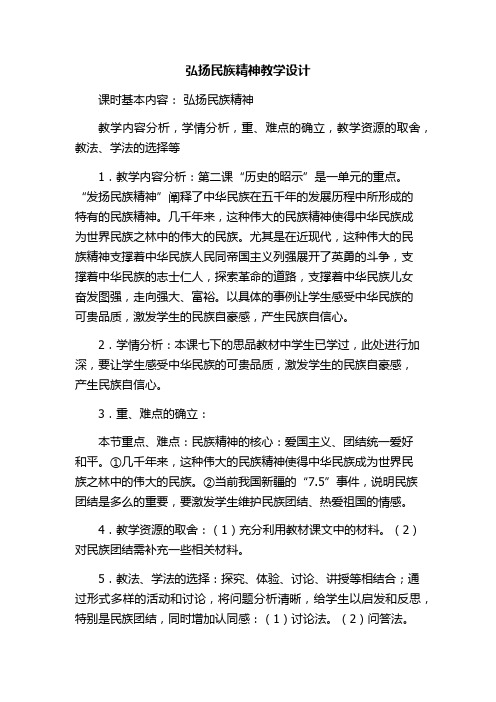
弘扬民族精神教学设计课时基本内容:弘扬民族精神教学内容分析,学情分析,重、难点的确立,教学资源的取舍,教法、学法的选择等1.教学内容分析:第二课“历史的昭示”是一单元的重点。
“发扬民族精神”阐释了中华民族在五千年的发展历程中所形成的特有的民族精神。
几千年来,这种伟大的民族精神使得中华民族成为世界民族之林中的伟大的民族。
尤其是在近现代,这种伟大的民族精神支撑着中华民族人民同帝国主义列强展开了英勇的斗争,支撑着中华民族的志士仁人,探索革命的道路,支撑着中华民族儿女奋发图强,走向强大、富裕。
以具体的事例让学生感受中华民族的可贵品质,激发学生的民族自豪感,产生民族自信心。
2.学情分析:本课七下的思品教材中学生已学过,此处进行加深,要让学生感受中华民族的可贵品质,激发学生的民族自豪感,产生民族自信心。
3.重、难点的确立:本节重点、难点:民族精神的核心:爱国主义、团结统一爱好和平。
①几千年来,这种伟大的民族精神使得中华民族成为世界民族之林中的伟大的民族。
②当前我国新疆的“7.5”事件,说明民族团结是多么的重要,要激发学生维护民族团结、热爱祖国的情感。
4.教学资源的取舍:(1)充分利用教材课文中的材料。
(2)对民族团结需补充一些相关材料。
5.教法、学法的选择:探究、体验、讨论、讲授等相结合;通过形式多样的活动和讨论,将问题分析清晰,给学生以启发和反思,特别是民族团结,同时增加认同感:(1)讨论法。
(2)问答法。
在导入阶段和课中,大量使用。
(3)阅读法。
对课中重要文字、图片、图表要引导学生阅读。
(4)笔记法。
课文中重要的概念、意义等要通过笔记批注和用笔勾画的方法进行标识。
(5)探究法。
结合课中的交流和探究。
(6)讲拟达成的教育教学目标知识目标:了解民族精神的基本内涵。
能力目标:学习搜集资料、以及结合历史资料分析问题、得出结论的方法。
态度、情感、价值观:培养学生的民族精神,对学生进行爱国主义教育。
教学流程一、课前准备:收集有关中华民族精神的名人名言和故事等资料。
英语人教版七年级下册U12Section B 阅读课课件
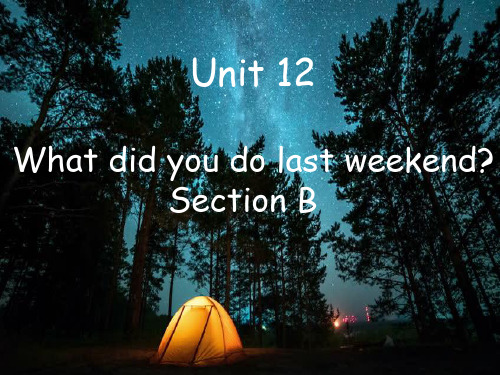
First, we took a long bus ride to a lake in the countryside. It’s a twenty-minute train ride from here.
He learned to ride a horse last year.
Can you ride a bike?
Feedback
牛顿太矮了而不能够到(reach)那个苹果。 Newton was so short that he can’t reach the apple. Newton was too short to reach the apple. Newton wasn’t tall enough to reach the apple.
A lesson
A lesson
Snakes don't have ears but can feel things moving ________.
Don't gonear a ______ snake.
Read the article together, and try to find the following phrases. 1. 作为一份特殊的礼物 as a special gift 2. 乘很久的公交车 3. 搭帐篷 4. 生火 5. 取暖 6.使某人做某事 take a long bus ride put up tents make a fire
so…that
I was so tired that I went to sleep early.
我如此疲惫以至于很快入睡了。 I was so scared that I couldn't move.
我太害怕以至于无法动弹。 Jack walked so slowly that he missed the school bus. 杰克走得太慢了,以至于错过了校车。
人教版英语七年级下册-Unit 12 Section B 阅读
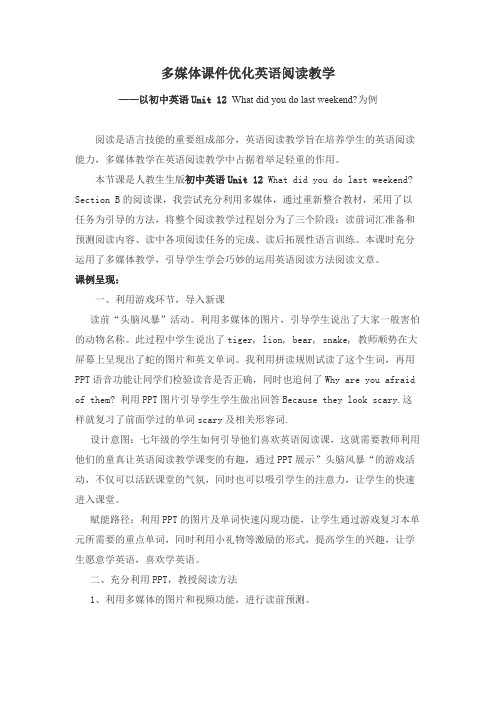
多媒体课件优化英语阅读教学——以初中英语Unit 12 What did you do last weekend?为例阅读是语言技能的重要组成部分,英语阅读教学旨在培养学生的英语阅读能力,多媒体教学在英语阅读教学中占据着举足轻重的作用。
本节课是人教生生版初中英语Unit 12 What did you do last weekend? Section B的阅读课,我尝试充分利用多媒体,通过重新整合教材,采用了以任务为引导的方法,将整个阅读教学过程划分为了三个阶段:读前词汇准备和预测阅读内容、读中各项阅读任务的完成、读后拓展性语言训练。
本课时充分运用了多媒体教学,引导学生学会巧妙的运用英语阅读方法阅读文章。
课例呈现:一、利用游戏环节,导入新课读前“头脑风暴”活动。
利用多媒体的图片,引导学生说出了大家一般害怕的动物名称。
此过程中学生说出了tiger, lion, bear, snake, 教师顺势在大屏幕上呈现出了蛇的图片和英文单词。
我利用拼读规则试读了这个生词,再用PPT语音功能让同学们检验读音是否正确,同时也追问了Why are you afraid of them? 利用PPT图片引导学生学生做出回答Because they look scary.这样就复习了前面学过的单词scary及相关形容词.设计意图:七年级的学生如何引导他们喜欢英语阅读课,这就需要教师利用他们的童真让英语阅读教学课变的有趣,通过PPT展示”头脑风暴“的游戏活动,不仅可以活跃课堂的气氛,同时也可以吸引学生的注意力,让学生的快速进入课堂。
赋能路径:利用PPT的图片及单词快速闪现功能,让学生通过游戏复习本单元所需要的重点单词,同时利用小礼物等激励的形式,提高学生的兴趣,让学生愿意学英语,喜欢学英语。
二、充分利用PPT,教授阅读方法1、利用多媒体的图片和视频功能,进行读前预测。
教师引导学生读标题,预测将要读到的内容(有关周末)。
Unit12 SectionB reading 课件2020-2021学年人教版英语七年级下册
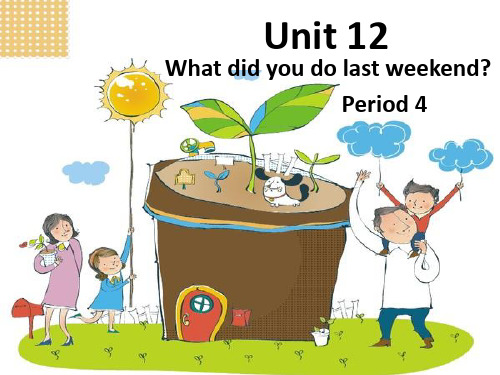
2. What did they do when they arrived at the village? They put up their tents and made a fire to keep them warm and cook food on. 3. What did the family do on the first night? They sat under the moon and told each other stories.
Homework
Write about your own weekend. A weekend to remember
1. It must be a special/meaningful/unusual/... weekend. 2. Use as many phrases we learned as possible.
IV. Describe the pictures using the phrases.
1
2
as a special gift took us to interesting but scary went camping
took a long bus ride to… put up our tents made a fire to keep us warm
The next morning, my sister and I were surprised. We saw a big snake near the fire. It was sleeping. I’m very scared and I couldn’t move. We shouted to our parents to let them know the danger. My Dad jumped inside the tent. The snake left.
- 1、下载文档前请自行甄别文档内容的完整性,平台不提供额外的编辑、内容补充、找答案等附加服务。
- 2、"仅部分预览"的文档,不可在线预览部分如存在完整性等问题,可反馈申请退款(可完整预览的文档不适用该条件!)。
- 3、如文档侵犯您的权益,请联系客服反馈,我们会尽快为您处理(人工客服工作时间:9:00-18:30)。
___ 6 snake went into the forest 2 put up our tents and cooked food ___ 8 learned a useful lesson ___ 4 saw a snake and shouted to parents for ___ help 7 snakes can’t hear but they can feel ___ things moving 5 my dad jumped up and down in his ___ tent 1 took a bus to a small village in India ___ 3 told stories under the moon, then went ___ to sleep
Why their parents took them to India? Because Lisa’s sister finished high school two weeks ago.
Read para 2 and find out their activities. Were they interesting? went camping in a small village took a long bus ride _______________________to a lake put up __________ a tent made a fire _____ sat _____ under the moon told stories _____ … so … and down
It’s important to keep calm(镇定) . Don’t … She must ….
Read para 1 and complete the main idea.
India The Lisa and her family went to ______. scary weekend was interesting _______ but ______.
What kinds of animals are people sometimes afraid of? Why? Make a list.
xxx is afraid of … because … he/she couldn’t move … is so scared that he/she shouted
Lisa had an interesting _____ but scary weekend. She ______ went camping _______ in a small village in _______. They took _____ a ____ India long lake in the countryside. There they ______ put up bus ride to a _____ keep them warm and cook their tents and made _____ a fire to _____ food on ___. On the first night, they just sat ____ under the moon told each other stories. The next morning, when Lisa and ____ out of their tent, they ____ got a terrible and her sister looked ___________ surprise _________--they saw a big snake _____sleeping ______ near the fire. Lisa shouted to was so scared _____ that she couldn’t _____. move They ___________ about the danger. Lisa’s let their parents to _____ them know _____ and down their tent. This_____ dad jumpedup ___________in woke the snake up forest near the lake. He told ____ and it moved into _____ the ______ feel things moving. Lisa that snakes don’t have ears ___ but can ___ This was a very useful ______lesson for ____ her.
a tent
1. How did Lisa feel when she saw the snake? ________________________________ She felt very scared.
2. What did Lisa and her sister do? They shouted to their parents to let them know the danger ________________________________________ 3. What did their father do? _____________________________________ Her father jumped up and down in their tent. Why did he do that? He wanted to wake up the snake. ____________________________ 4. What lesson did Lisa learn from the weekend? ________________________________ Snakes don’t have ears but they can feel things moving.
Read para 3 and answer the questions
1. How did Lisa feel when she saw the snake? 2. What did Lisa and her sister do? 3. What did their father do? Why did he do that? 4. What lesson did Lisa learn from the weekend?
